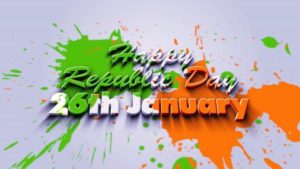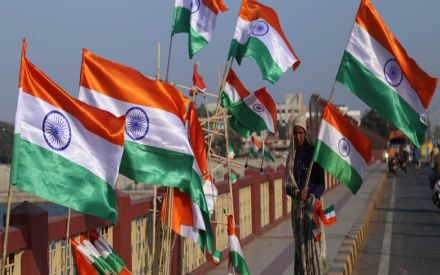26 January 1950 was the day India’s Constitution came into effect, and the country became a republic. The day- 26 January- was chosen for a particular reason, as it marked a key event in the struggle for India’s freedom from British rule.
Why was 26 January chosen to be India’s Republic Day?
In 1929, Lahore hosted the Indian National Congress session, in which Jawaharlal Nehru was president. At the time, Nehru and Subhash Chandra Bose were together working to oppose those in the Congress party who were satisfied with ‘dominion status’, wherein the British monarch would continue to be the head of government.
On December 31, 1929, Nehru hoisted the tricolour on the banks of the Ravi river and demanded “Poorna Swaraj” or complete self-rule, and the date set for independence was January 26, 1930. The day was then celebrated as Poorna Swaraj day for the next 17 years. On January 26, 1930, the Congress passed the Poorna Swaraj resolution or the Declaration of Independence.
Text of the Poorna Swaraj Resolution
THE DECLARATION OF INDEPENDENCE – PLEDGE TAKEN BY PEOPLE IN LAHORE AT THE SESSION OF THE INDIAN NATIONAL CONGRESS ON JANUARY 26, 1930
We believe that it is the inalienable right of the Indian people, as of any other people, to have freedom and to enjoy the fruits of their toil and have the necessities of life, so that they may have full opportunities of growth. We believe also that if any government deprives a people of these rights and oppresses them the people have a further right to alter it or to abolish it. The British Government in India has not only deprived the Indian people of their freedom but has based itself on the exploitation of the masses, and has ruined India economically, politically, culturally, and spiritually. We believe, therefore, that India must sever the British connection and attain Purna Swaraj, or complete independence. …..

We hold it to be a crime against man and God to submit any longer to a rule that has caused this fourfold disaster to our country. We recognise, however, that the most effective way of gaining our freedom is through nonviolence. We will therefore prepare ourselves by withdrawing, so far as we can, all voluntary association from the British Government, and will prepare for civil disobedience, including nonpayment of taxes. We are convinced that if we can but withdraw our voluntary held and stop payment of taxes without doing violence, even under provocation, the end of this inhuman rule is assured. We therefore hereby solemnly resolve to carry out the Congress instructions issued from time to time for the purpose of establishing Purna Swaraj.
Poorna Swaraj Day becomes Republic Day
When India became independent in 1947, the day set by the British was August 15– chosen to coincide with the second anniversary of the day when Japanese forces submitted to allied powers after the Second World War. The historian Ramachandra Guha notes, “freedom finally came on a day that resonated with imperial pride rather than nationalist sentiment.”
Thus, when the Constitution of India was adopted on 26th November, 1949, many considered it necessary to celebrate the document on a day associated with national pride.
The Poorna Swaraj day was the best option– January 26. It has since been celebrated as the country’s Republic Day.
Source:Indian Express

Readers like you, make ESHADOOT work possible. We need your support to deliver quality and positive news about India and Indian diaspora - and to keep it open for everyone. Your support is essential to continue our efforts. Every contribution, however big or small, is so valuable for our future.











